 Near AIIMS Phulwari Sharif Patna
Near AIIMS Phulwari Sharif Patna [email protected]
[email protected] 7369848448
7369848448
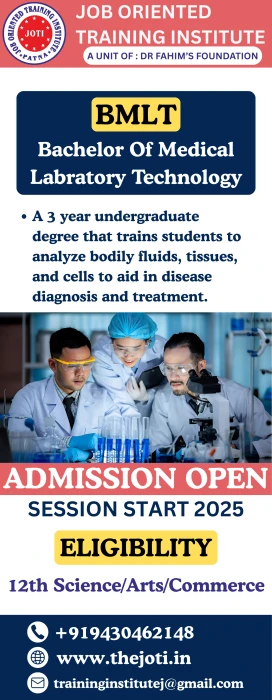
The scope of a Bachelor of Medical Laboratory Technology (BMLT) degree is vast and diverse. Here are some potential career paths and areas of scope:
1. Laboratory Technician: Work in hospitals, clinics, or private laboratories conducting tests and analyses.
2. Medical Research: Assist in research projects, collect and analyze data, and contribute to medical breakthroughs.
3. Quality Control: Ensure accuracy and precision in laboratory testing and procedures.
4. Laboratory Management: Supervise laboratory operations, manage staff, and maintain quality standards.
5. Teaching and Education: Share knowledge and skills by teaching in academic institutions or training programs.
6. Consulting: Offer expertise as a consultant to laboratories, hospitals, or healthcare organizations.
7. Healthcare Administration: Apply laboratory knowledge in administrative roles, such as healthcare management or public health.
8. Specializations: Pursue specialized fields like molecular diagnostics, cytogenetics, or histopathology.
9. Industry Roles: Work in pharmaceuticals, biotechnology, or medical device companies.
10. Further Education: Pursue advanced degrees (MMLT, PhD) for enhanced career opportunities.
11. Entrepreneurship: Establish private laboratories or start healthcare-related ventures.
12. Public Health: Contribute to disease surveillance, prevention, and control programs.
13. Government Agencies: Work in government laboratories, regulatory agencies, or health departments.
14. Clinical Trials: Participate in conducting and monitoring clinical trials.
15. Medical Writing: Create scientific content, publications, or educational materials.
Remember, this list is not exhaustive, and the scope of BMLT continues to expand with advancements in healthcare and technology!
Here is a general syllabus for a 3-year Bachelor of Medical Laboratory Technology (BMLT) program: Year 1: - Semester 1: - Introduction to Medical Laboratory Technology - Anatomy and Physiology - Biochemistry - Microbiology - Laboratory Safety and Ethics - Semester 2: - Clinical Biochemistry - Hematology - Immunology - Molecular Biology - Laboratory Instrumentation Year 2: - Semester 3: - Clinical Microbiology - Parasitology - Serology - Blood Banking - Urinalysis - Semester 4: - Histopathology - Cytology - Immunohematology - Molecular Diagnostics - Research Methodology Year 3: - Semester 5: - Advanced Clinical Biochemistry - Advanced Hematology - Advanced Microbiology - Quality Control and Quality Assurance - Laboratory Management - Semester 6: - Project Work/Dissertation - Viva Voce Electives (choose one): - Medical Imaging Technology - Medical Informatics - Healthcare Management - Epidemiology Practical Training: - Students will undergo practical training in various laboratory settings, including clinical biochemistry, hematology, microbiology, and molecular diagnostics. Internship: - Students will undergo a 6-month internship in a hospital or laboratory setting, where they will gain hands-on experience in medical laboratory technology. Note: The syllabus may vary depending on the institution and country. This is just a general outline.
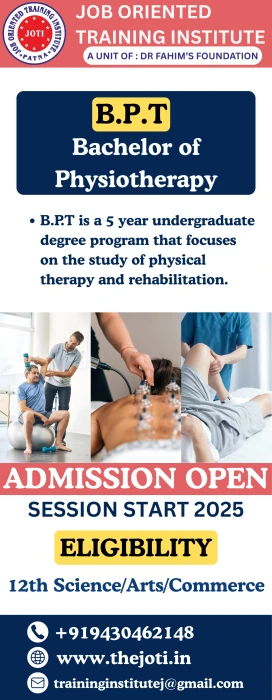
Here is a syllabus for a 4-year Bachelor of Physiotherapy (BPT) program: Year 1: - Semester 1: - Anatomy - Physiology - Biomechanics - Kinesiology - Introduction to Physiotherapy - Semester 2: - Physiotherapy Techniques - Therapeutic Exercises - Electrotherapy - Heat and Cold Therapy - Massage and Manual Therapy Year 2: - Semester 3: - Musculoskeletal Physiotherapy - Neurological Physiotherapy - Cardiovascular and Respiratory Physiotherapy - Pediatric Physiotherapy - Geriatric Physiotherapy - Semester 4: - Research Methods and Biostatistics - Physiotherapy in Sports - Occupational Health and Ergonomics - Community-Based Rehabilitation - Pharmacology and Pharmacotherapy Year 3: - Semester 5: - Advanced Musculoskeletal Physiotherapy - Advanced Neurological Physiotherapy - Advanced Cardiovascular and Respiratory Physiotherapy - Advanced Pediatric Physiotherapy - Advanced Geriatric Physiotherapy - Semester 6: - Clinical Reasoning and Decision Making - Leadership and Management in Physiotherapy - Health Promotion and Education - Interprofessional Collaboration and Communication - Electives (e.g., Manual Therapy, Acupuncture, etc.) Year 4: - Semester 7: - Internship/ Clinical Placement - Research Project/ Dissertation - Advanced Research Methods and Biostatistics - Specialized Physiotherapy Courses (e.g., Orthopedic Manual Therapy, Neurological Rehabilitation, etc.) - Professional Development and Entrepreneurship
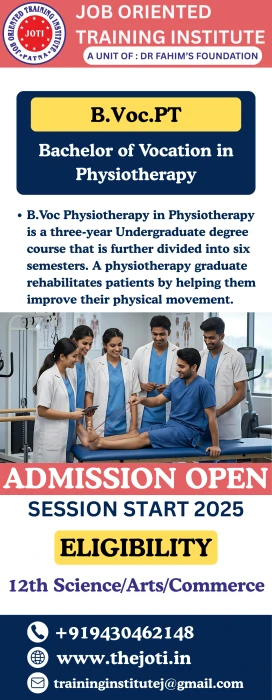
A B.Voc in Physiotherapy is a three-year undergraduate vocational degree designed to train students as physiotherapy assistants and technologists by providing practical skills and theoretical knowledge in physical rehabilitation, exercise therapy, and patient care. The program offers hands-on experience in assessing and treating musculoskeletal and neurological conditions, with a focus on clinical practice and working in various healthcare settings under the supervision of professional physiotherapists. Key aspects of the B.Voc in Physiotherapy: Career-focused: The program is centered on preparing students for skilled roles in the healthcare industry, rather than becoming a fully licensed physiotherapist. Practical Skills: Students gain hands-on experience with patient care, therapeutic exercises, manual therapy techniques, and the use of modern equipment. Curriculum: The coursework includes subjects like anatomy, physiology, pathology, rehabilitation strategies, and professional ethics. Role of a Graduate: Graduates are prepared to assist physiotherapists in providing treatments and rehabilitation services to patients in hospitals, rehabilitation centers, and other healthcare environments. Integration of Theory and Practice: The B.Voc program combines theoretical knowledge with significant practical training and clinical exposure to prepare students for the demands of the healthcare environment. What to expect from a B.Voc in Physiotherapy: Assessment and Treatment: You'll learn to assess and treat physical impairments and disabilities, focusing on enhancing patient mobility and recovery. Patient-Centered Care: The course emphasizes the importance of patient care, communication skills, and ethical practice. Diverse Settings: Graduates can find opportunities to work in various healthcare settings, including hospitals, private practices, and rehabilitation centers. Industry Relevance: The vocational nature of the degree ensures that graduates are equipped with the specific skills and knowledge required for the job market in physiotherapy.
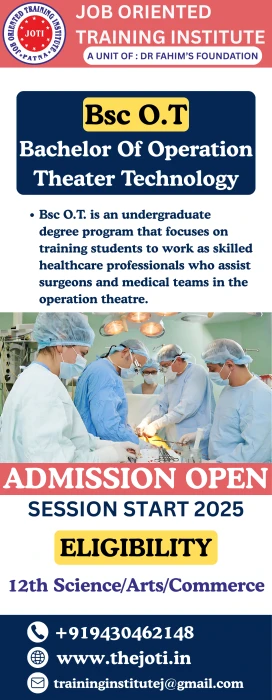
Here is a syllabus for a 3-year Bachelor's program in Operation Theatre Technology (OTT): Year 1: - Semester 1: - Introduction to Operation Theatre Technology - Anatomy and Physiology - Surgical Procedures and Techniques - Operation Theatre Equipment and Instruments - Sterilization and Disinfection - Semester 2: - Patient Safety and Care - Surgical Nursing and Assistance - OT Management and Organization - Medical Ethics and Law - Communication and Interpersonal Skills Year 2: - Semester 3: - Advanced Surgical Procedures and Techniques - Anesthesia and Anesthetic Techniques - OT Technology and Innovations - Quality Control and Quality Assurance - Research Methods and Statistics - Semester 4: - Clinical Workshops and Seminars - Case Studies and Discussions - Internship in OT Department - Advanced OT Equipment and Instrumentation - Specialized Surgical Procedures Year 3: - Semester 5: - Advanced OT Management and Organization - Leadership and Team Management - Patient Education and Counseling - Healthcare Policy and Administration - Advanced Research Methods and Statistics - Semester 6: - Project Work/Dissertation - Advanced Clinical Workshops and Seminars - Continuing Education and Professional Development - Review and Preparation for Certification Exams Note: This syllabus may vary depending on the institution and program. Some programs may also include additional topics or specializations. This syllabus provides a comprehensive education and training in operation theatre technology, preparing students for roles such as OT managers, surgical assistants, and anesthetic technicians.
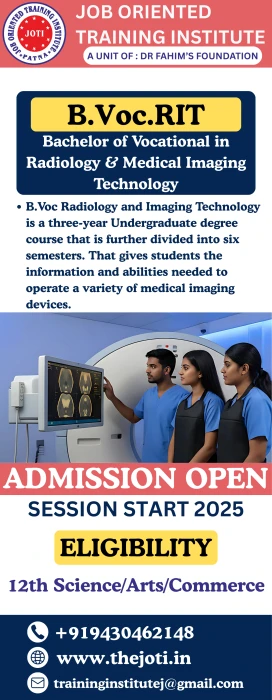
A Bachelor of Vocation (B.Voc) in Radiology and Imaging Technology is a three-year undergraduate program focusing on vocational training in diagnostic imaging procedures. The curriculum is highly industry-oriented, designed to equip students with practical skills and hands-on experience using modern medical imaging equipment. Course overview This skill-based degree trains students to become radiology technologists who can operate sophisticated diagnostic imaging equipment like X-ray, CT scans, and MRI machines. It is different from a traditional B.Sc. in Radiology, as the B.Voc provides more practical training for immediate employability. Duration The course lasts for three years, divided into six semesters. Many programs also include a mandatory internship in a hospital or diagnostic center. Key subjects Core subjects typically covered in the syllabus include: Human Anatomy and Physiology Radiation Physics and Safety Radiographic and Image Processing Techniques Specific imaging modalities like CT, MRI, and ultrasound Patient Care and Medical Ethics Eligibility criteria To be eligible for the program, candidates must have completed their 10+2 (or equivalent) education, usually in the science stream. Requirements may include: A science background with subjects like Physics, Chemistry, and Biology. A minimum aggregate score of around 50% in the 12th board examination. Some colleges may require a specific entrance examination for admission. Career opportunities After completing a B.Voc in Radiology and Imaging Technology, graduates can find various roles in hospitals, diagnostic centers, clinics, and medical imaging companies. Potential career paths include: Radiology Technologist/Radiographer: Performs general diagnostic imaging procedures, such as X-rays. CT Scan Technologist: Specializes in operating Computed Tomography (CT) scanners. MRI Technologist: Operates Magnetic Resonance Imaging (MRI) machines to produce detailed images of the body. Ultrasound Technologist (Sonographer): Uses high-frequency sound waves to create images of internal body structures. Nuclear Medicine Technologist: Prepares and administers radioactive drugs for imaging and treatment. Application Specialist: Works with companies that manufacture medical imaging equipment to provide technical support and sales assistance. Radiology Supervisor or Manager: Oversees the daily operations of an imaging department after gaining experience.
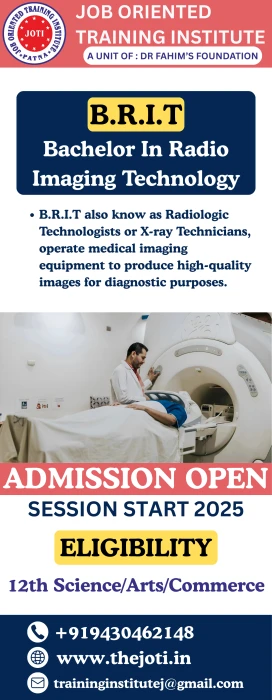
Here is a general syllabus for a 3-year Bachelor of Radiology and Imaging Technology program: Year 1: - Semester 1: - Introduction to Radiology and Imaging Technology - Human Anatomy and Physiology - Radiation Physics and Safety - Imaging Techniques and Procedures - Radiological Equipment and Maintenance - Semester 2: - Radiography and Imaging Principles - Patient Care and Communication - Radiation Protection and Safety - Imaging Modalities (X-ray, CT, MRI) - Medical Ethics and Law Year 2: - Semester 3: - Advanced Radiography and Imaging Techniques - Cross-Sectional Anatomy - Imaging Pathology and Disease Processes - Radiopharmacology and Contrast Media - Research Methodology and Biostatistics - Semester 4: - CT Scanning and Imaging - MRI and Spectroscopy - Ultrasound and Doppler Imaging - Nuclear Medicine and PET Imaging - Quality Control and Quality Assurance Year 3: - Semester 5: - Advanced Imaging Modalities (Mammography, Fluoroscopy) - Interventional Radiology and Procedures - Radiation Therapy and Oncology - Imaging Informatics and PACS - Healthcare Management and Administration - Semester 6: - Project Work/Dissertation - Viva Voce - Clinical Internship/Practicum Electives (choose one): - Cardiovascular Imaging - Neuroradiology - Musculoskeletal Imaging - Pediatric Imaging - Healthcare Informatics Practical Training: - Students will undergo practical training in various radiology and imaging departments, including X-ray, CT, MRI, and ultrasound. Internship: - Students will undergo a 6-month internship in a hospital or imaging center, where they will gain hands-on experience in radiology and imaging technology. Note: The syllabus may vary depending on the institution and country. This is just a general outline.
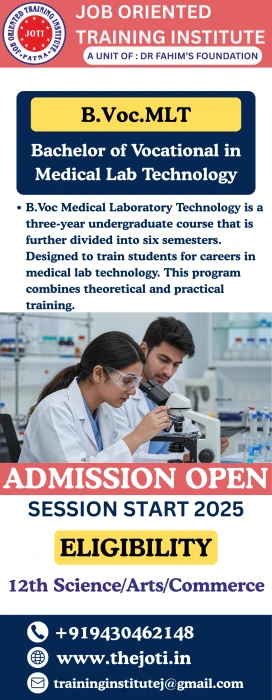
A Bachelor of Vocation (B.Voc) in Medical Laboratory Technology (MLT) is a three-year undergraduate program that focuses on practical, skill-based training in diagnostic laboratory sciences. The curriculum emphasizes hands-on experience, preparing students for immediate employment in the healthcare industry upon graduation. Course structure and exit options The B.Voc program is aligned with the University Grants Commission's (UGC) National Skills Qualifications Framework (NSQF) and features multiple exit points. Exit after 1 year: Earn a Diploma in Medical Laboratory Technology. Exit after 2 years: Earn an Advanced Diploma in Medical Laboratory Technology. Complete 3 years: Receive the Bachelor of Vocation (B.Voc) degree in Medical Laboratory Technology. Key subjects covered Throughout the program, students gain expertise in a variety of diagnostic and laboratory techniques. Core subjects: Biochemistry, Hematology, Microbiology, Immunology, Histopathology, and Clinical Pathology. Practical skills: Phlebotomy (blood sample collection), handling advanced laboratory equipment, and ensuring quality control. Professional training: Laboratory management, medical ethics, patient safety, and communication skills. Eligibility criteria While requirements can vary by institution, general eligibility for a B.Voc in MLT typically includes: Completion of 10+2 (or equivalent) from a recognized board. Most institutions require a Science stream with Physics, Chemistry, and Biology (PCB), with minimum marks (often 50%). Some institutions may offer flexibility for students from other streams who demonstrate an aptitude for the field. Career scope and job opportunities Graduates of a B.Voc in MLT have strong employability in the healthcare sector, which has a high demand for skilled lab professionals. You can find employment in hospitals, diagnostic labs, research facilities, and blood banks. Common job roles include: Medical Laboratory Technician Blood Bank Technician Research Assistant Laboratory Supervisor or Manager Quality Control Specialist Clinical Research Coordinator Higher education For those interested in further specialization, a B.Voc in MLT also serves as a foundation for postgraduate studies in fields like: M.Sc. Medical Laboratory Technology M.Sc. Clinical Research M.Sc. Microbiology or Biochemistry